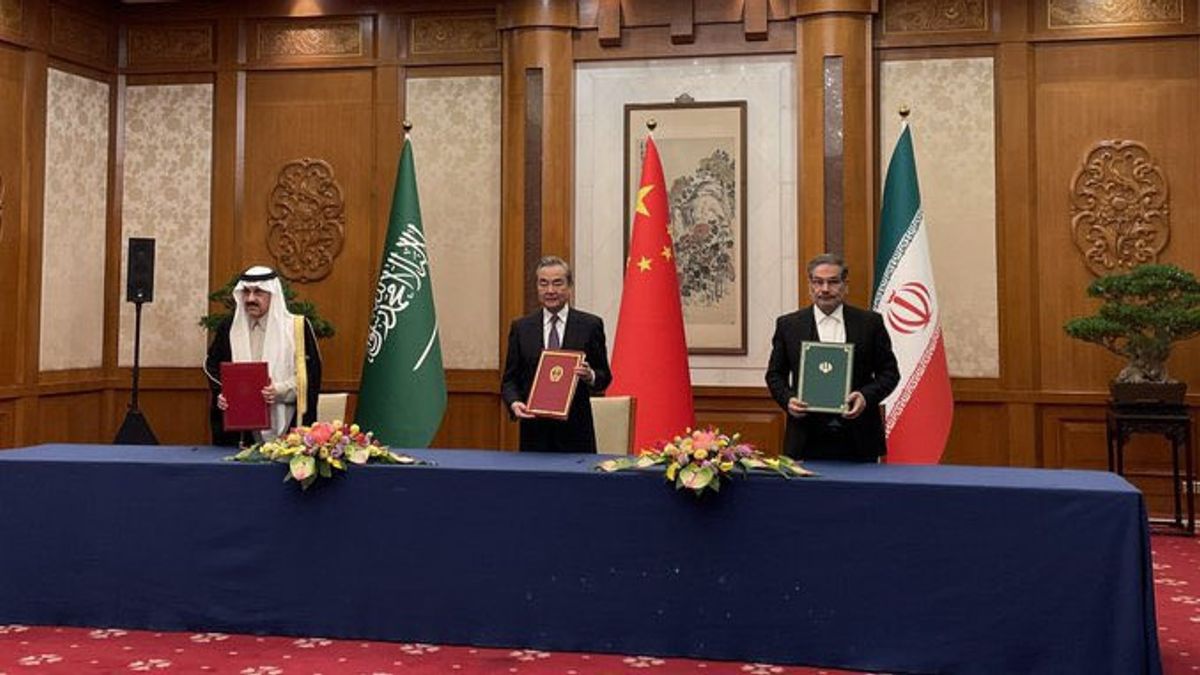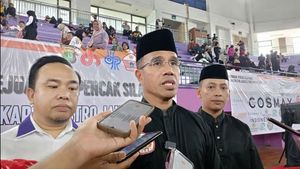JAKARTA - Iran and Saudi Arabia agreed on Friday to rebuild relations after seven years of hostilities, threaten stability and security in the Gulf and co-trigger conflict in the Middle East from Yemen to Syria.
The deal came after four days of previously undisclosed talks in Beijing between top security officials from the two countries.
Tehran and Riyadh agreed to continue diplomatic relations and reopen the embassy within two months, according to a statement issued by Iran, Saudi Arabia and China. "The agreement includes their affirmation of respect for the country's sovereignty and not interfering in domestic affairs," the statement said.
In recent years, Saudi Arabia has blamed Iran for missile and drone attacks at royal oil facilities in 2019, as well as attacks on tankers in Gulf waters. Iran denies the allegations.
The Iran-aligned Houthi group in Yemen has also carried out cross-border missile and drone attacks on Saudi Arabia, leading the coalition against the Houthis, and in 2022 expanding attacks on the UAE.
Friday's agreement, signed by top Iranian security official Ali Shamkhani and Saudi Arabia's national security adviser Musaed bin Mohammed Al-Aiban, agreed to reactivate the 2001 security cooperation agreement, as well as other previous pacts on trade, economy and investment.
China, Saudi Arabia and #Iran released a joint statement on Friday saying #Saudi Arabia and Iran have agreed to re-establish ties and reopen embassies after a meeting in #Beijing. pic.twitter.com/q1t4lbbMtr
— Zhang Heqing张和清 (@zhang_heqing) March 10, 2023
China's top diplomat Wang Yi described the deal as a victory for dialogue and peace, adding that Beijing will continue to play a constructive role in tackling difficult global problems.
A White House national security spokesman said the United States was aware of the agreement's report and welcomed any efforts to help end the war in Yemen and reduce tensions in the Middle East.
The long-standing strategic relationship between Saudi Arabia and the United States is strained under President Joe Biden's administration over the record of royal human rights, Yemen's war and recent relations with Russian oil production and OPEC+.
On the other hand, Saudi Arabia's relations with China are increasingly intimate, reinforced by the visit of Beijing leader President Xi Jinping three months ago.
It is known that Iran and Saudi Arabia, each of the two leading Shia and Sunni powers in the Middle East, have been at odds for years and supported opposing parties in the proxies war from Yemen to Syria and elsewhere.
Saudi Arabia cut ties with Iran in 2016 after its embassy in Tehran invaded during a dispute between the two countries over the execution of Riyadh against a Shiite cleric.
Relations normalization offers great prospects for both countries and the Middle East, Iranian Foreign Minister Hossein Amirabdollahian said, hinting at further steps.
"Environmental policy, as the main axis of the Iranian government's foreign policy, is moving in the right direction and diplomatic forces are actively behind preparations for other regional measures," Amirabdollahian tweeted.
A senior Iranian official said that overcoming tensions with Saudi Arabia has been Tehran's top priority in recent months and will help resolve long-term talks on Iran's nuclear program.
"This will prompt the West to reach a nuclear deal with Iran," the official told Reuters.
The English, Chinese, Japanese, Arabic, and French versions are automatically generated by the AI. So there may still be inaccuracies in translating, please always see Indonesian as our main language. (system supported by DigitalSiber.id)













